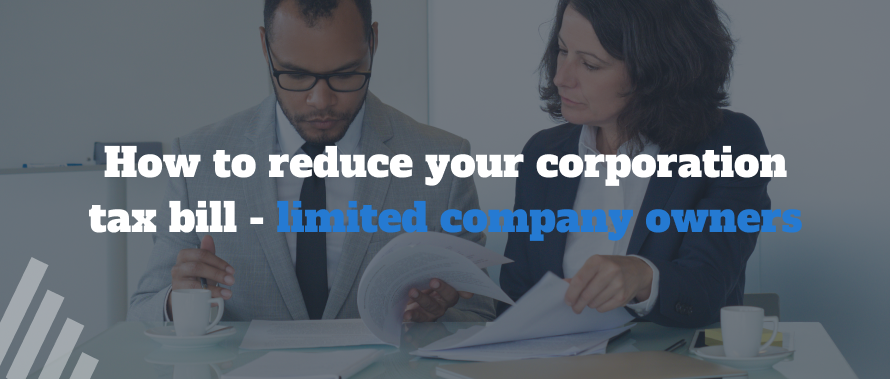With Corporation Tax increases in 2023, now more than ever, it’s critical that business owners understand how to minimise their corporation tax liability and maximise the marginal relief available to them.
Reducing your Corporation Tax liability can be done in many ways including making pension contributions, claiming capital allowances, via company cars, optimising allowable expenses, R&D tax relief etc.
In this blog we look at these points in more detail and give you tips to reduce your overall corporation tax liability.

Corporation tax rates
Corporation Tax increased from 1 April 2023. For small companies with profits of less than £50,000, the rate remains at 19%. For businesses whose taxable profits exceed £250,000, the rate will increase to 25%. For companies in between there will be a sliding scale of rates.
Companies with taxable profits between £50,000 and £250,000 will pay tax at the 25% rate, but this will be reduced by a marginal relief meaning CT rates of between 19% and 25%. So, the main rate less marginal relief for companies with profits between £50,000 and £250,000, effective rate 26.5%.
As we can see, it’s already complicated to decide which rate applies.
As you would expect, the £50,000 and £250,000 limits relate to 12-month accounting periods and therefore must be time apportioned for a short accounting period.This is because the company could file a shorter accounting period and pay less tax. This will reduce the upper limit and the lower limit.
Associated companies
A question we get asked is – Can we avoid main rate CT by opening multiple companies? This is negated by the legislation as it requires the limits to be shared by any companies that are associated with each other.
Companies are associated where the following exists at any time in accounting period:
- One company under control of other, or
- Both are under control of same person or persons
It doesn’t matter where the company resident, or if only associated for part of period. HMRC will ignore dormant and passive holding companies.
The corporation tax rate limits of £250,000 and £50,000 are divided by the total number of associated companies (including the company itself).
Associated companies’ example
Example: Company X has two associated companies, and has taxable profits of £30,000 for the year ended 31 March 2024:
Without associated companies CT - £30,000 x 19% = £5700
2 Associated companies:
- Upper limit - £250,000/3 = £83,333
- Lower Limit - £50,000/3 = £16,667
CT Liability: £30,000 x 25% £7,500
Less: Marginal relief – 3/200 x (£83,333-30,000) (£800)
Corporation Tax £6,700
Early tax planning
Reducing your corporation tax bill should be a key tax planning consideration for business owners and should form part of wider tax planning for limited companies. This shouldn’t only be considered as you near your company year-end, but you should seek tax planning advice early from a qualified tax consultant such as those in the dns tax team, who can work with you to reduce corporation tax.
Leaving corporation tax planning until the last minute just before your year-end will minimise the strategies that you can implement. We would recommend seeking advice at least 3-4 months before your year-end to plan and reduce your corporation tax bill and get your tax affairs in order.
Here at dns, we believe that whilst it is important to pay tax, no one should pay more than their fair share, so we work with clients on minimising their tax bill and claiming the right tax relief.
Company pension contributions
Company pension contributions are a very tax efficient way to reduce your corporation tax bill. As a business owner using the company profits to make pension contributions will help to save corporation tax.
The pension contribution allowance has increased to £60,000 per year from 2023/24, unless you are subject to tapered relief because of high income.
Companies typically get tax relief for pension contributions when they pay them, not when they’re accrued or recorded in the books, only on a paid basis. So, if your year end is 31 March 2024, the cash should leave your bank account on that day or before to get the relief.
HMRC might refuse to allow a contribution if they think it’s not a valid business expense or if it’s not solely for trade purposes. For instance, if it’s tied to excessive pay packages or linked to selling or stopping a business.
Companies can setup their own pension scheme like SSAS, which are more flexible and allows you to do so much more with your pensions.
Directors loan to the company
The other way to minimise your corporation tax liability is for the directors and shareholders to loan money to the company at a commercial interest rate. Any interest that the company pays is deductible for corporation tax purposes, provided the money which has been lent is used for the company’s trade.
Limited Company directors or shareholders can lend money to the company on a commercial interest rate. The interest paid by the company is deductible for corporation tax purposes provided it is used for company’s trade.
The interest should be commercial and not excessive or else the expense may be disallowed
The company will have to deduct 20% basic rate tax and report this to HMRC on CT61. The taxpayer can then claim the deduction through self-assessment.
For the starting rate of savings to apply the taxable non-savings like employment and self-employment income should be less than £5,000
Capital allowances
UK companies do not pay capital gains tax, but instead must include any capital (or chargeable) gains in their total profits within their corporation tax calculations. Corporation tax on chargeable gains is normally calculated following the same rules as capital gains tax. When the business is investing in capital business assets like plant and machinery, which usually provide an enduring benefit to the company, then the relief for these expenses is given through a procedure called capital allowances. This applies to certain business assets which provide enduring benefit to the business or have an expected lifespan of more than 2 years.
The capital allowances available are:
Annual Investment allowance (AIA)
The AIA allows businesses to claim full cost of qualifying capital expenditure in the tax year the expenditure was incurred, up to a specified limit.
For the period between 1st January 2019 and 31st March 2023, the AIA limit was set at £1 million. This limit has been permanently increased from 1st April 2023.
For property purchased after April 2014, two other conditions must be met if the buyer is to obtain any allowances on the fixtures. These are ‘Pooling Requirement’ (see below) and ‘Fixed Value Requirement’.
100% First Year Allowance (FYA)
You can claim the full amount for certain plant and machinery in the year that it was bought. This means that a business can deduct the entire cost of the business asset from their taxable profits in the year of purchase, instead of claiming the cost over several years. FYA is available for specific assets, including electric or low-emission cars and energy-saving equipment.
Writing Down Allowance (WDA)
You can claim these if your plant and machinery does not qualify for AIA or if you’ve already claimed the maximum amount. It’s designed to provide tax relief for capital expenditures over a period of years. WDAs are calculated annually based on the decreasing value of an asset, rather than its original cost.
If an item qualifies for more than one capital allowance, you can choose which one to use.
From April 2023 until the end of March 2026, companies can claim 100% capital allowances on qualifying plant and machinery investments. Full expensing allows companies to write off the cost of investment in one go. Under full expensing, for every pound a company invests, their taxes are cut by up to 25p.
Capital allowances and property
Capital allowances are important for companies with property investment business if investing in commercial property and furnished holiday lets/serviced accommodation. Business premises are not plant because they are not “goods or chattels” employed in carrying on the business. Rather, they are the place or setting in which the business is conducted. However, fixtures and fittings, for example a boiler or a radiator installed in a building or integral features such as lifts/escalators, air cooling systems, space heating systems are do qualify for relief at the special rate of 6% per annum on a reducing-balance basis. The main rate is 18% per annum.
HMRC tightened up the rules on capital allowances for fixtures in Finance Act 2012. Which now requires that within 2 years of the completion date for the sale of the property the seller and purchaser jointly elect the amount of the sale proceeds which are attributed to those fixtures.
Pooling Requirement
When a property is sold, the parties involved need to set out the need to meet a ‘pooling requirement’ which is to fix the amount of capital allowances based on the consideration paid by the first person who was entitled to claim the capital allowances, coupled with the requirement to then fix the value of the allowances to be transferred to the purchaser. The pooling requirement means that the vendor will need to ‘certify’ the level of capital allowances and pool them; essentially, they are taking ownership of the allowances,
The pooling requirement requires the seller to:
- add the qualifying expenditure to the plant and machinery tool (typically the main pool or the special rate pool), or
- claim a first-year allowance in respect of that expenditure.
Note: There is no requirement that allowance should have been claimed on the asset by the seller.
Garden room home office
With the rise of remote mass working, running a business from home has massively expanded. As a result, many business owners are building garden offices to work from.
With a garden office, the cost of structure does not qualify for tax relief and also claiming for supplies for utilities will be blocked. However, if you install any fixtures or insulate the structure, you can make a capital allowance claim to get tax relief.
Ongoing expenses can be relieved unless there is private use and when you come to sell your home, there may be tax implications to consider. It’s vital to take advice from your accountant regarding how these buildings are paid for.
Electric company vehicles
The government has made efforts to move business vehicles from petrol and diesel to greener options by making the tax on electric vehicles more attractive. Capital allowances mean companies can claim tax relief on the assets they buy which, in turn, reduces their Corporation Tax bill.
The company can provide the directors or employees with a car for business and private use. However, if the car is merely available for personal use the employee will be subject to benefit in kind tax and the company must pay employer national insurance.
New and unused fully electric vehicles with Co2 emissions of 0gm/km qualify for 100% first-year allowances, so you can claim tax relief on the full value of the asset. Which means the company can claim a Corporation Tax deduction on the full value of the car in the first year itself.
The benefits of electric cars do not include leased or hybrid cars. Also note that second hand cars only qualify for main rates as follows: 50/gm or less – 18%, more 50gm/km – 6%
Allowable business expenses
It may seem trivial, but putting in place systems that capture every type of allowable expenses is a critical component of the tax planning for your business and reducing corporation tax. An allowable expense is an expense incurred by the company that is tax deductible.
No matter how small the expense incurred for business purposes, get a receipt or invoice and claim the expense. These small expenses are tax deductible and can mount up over time to make significant tax savings.
These expenses are only deductible if used wholly and exclusively for business. Business owners pay for things sometimes personally, so you should always remember to claim business expenses paid personally on an expenses claim to the company. This may include items such as business mileage, travel and subsistence, subscriptions etc.
R&D Tax relief
If your business is innovating with new products, processes or services, tax relief is available in the form of a Research & Development expenditure credit.
R&D is still a relief that is overlooked by many companies. Small companies tend to fear making a claim, but R&D credits can provide a valuable cash boost to a business. However, the claims need to be made properly and for legitimate qualifying costs, so speak to an accountant like dns accountants to see if you will qualify. Often the credit obtained will pay for the accountancy fees in making the claim and more.
This relief is available to Limited Companies and means you can claim relief on costs incurred in the provision of Research & Development. R&D occurs when a project or activity seeks to achieve an advancement in science or technology through the resolution of uncertainty.
R&D tax relief can reduce a company’s Corporation Tax bill and is available to any sector or business. It comes in the form of a cash repayment from HMRC. There are currently two R&D schemes available to eligible companies, which are:
- SME R&D Tax Relief - Giving you 43.7p or 33.5p for each £1 spent on R&D qualifying activity.
- R&D Expenditure Credits (RDEC) - 9.72p per £1 spent for qualifying activity.
Patent box scheme
As well as R&D it is worth checking if your company can pay a reduced rate of 10% Corporate Tax if it exploits patented inventions and innovations.
The Patent Box is designed to encourage companies to keep and commercialise intellectual property in the UK. It allows companies to apply a lower rate of Corporation Tax to profits earned from its patented inventions. You’ll only be eligible if the following is applicable:
- You make a profit from exploiting patented inventions.
- You own or have exclusively licenced-in the patents.
- has undertaken qualifying development on the patents.
Creative industries tax relief
If your business is in the creative industries, you may be able to claim Creative Industries tax reliefs (CITRs). There is a range of specific reliefs within CITR, depending on which creative industry your business operates within.
Other points
Paying corporation tax bill early
If you have a cash surplus in the business, you could pay your Corporation Tax early. If you did, HMRC would pay you interest of 0.5%. Don’t forget, though, that the interest you earn is taxable.
Enterprise investment schemes
This scheme encourages investment in smaller, high-risk companies by providing tax incentives to investors. So, it’s worth exploring the benefits of the Enterprise Investment Scheme (EIS) if you have surplus cash in the business as it could be a way of reducing your corporation tax bill.
Employ family members
Employing family members could help to reduce your corporation tax liability and also help you to get money out of the company in a tax efficient way. Salaries come out of profits derived and will therefore reduce your corporation tax bill.
Foreign withholding tax
This can be deducted from UK corporation tax as effectively a tax reducer (allowing for the fact it’s the lower withholding tax or UK corporation tax on the sale). You can take it as an expense and increase your losses going forward by the tax withheld.
Claim loss reliefs
Utilise available loss reliefs to offset future profits to reduce your overall tax liability. Understand the process of offsetting losses within your business and how it can lead to tax savings. Explore the complexities of claiming overseas losses and credits and how it can affect your corporation tax bill.
Don’t miss tax deadlines
A simple but often forgotten way to minimise liabilities is to avoid interest, penalties, and other costs, associated with filing or paying tax late. Timely tax filing and payments are important to reduce your outgoings.
Conclusion
Looking after your business money is as important as looking after your personal money. There are many ways to reduce corporation tax and claim any corporation tax relief that may be due to your business.
Many businesses leave their corporate tax planning too late or don’t seek professional advice early enough and miss opportunities for minimising their corporation tax liabilities.
Minimising your corporation tax bill can provide you with greater financial stability and minimise tax deductions that your company face. A good accountant such as dns accountants can help you run your company in the most tax efficient way.
For help and advice on how to reduce your corporation tax liability call us today on 03330602481 or email on enquiry@dnsaccountants.co.uk
Any questions? Schedule a call with one of our experts.

_(1).png)






